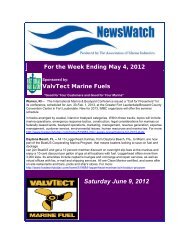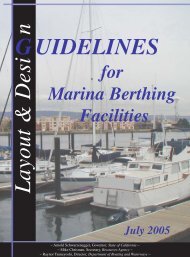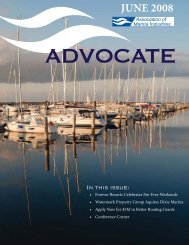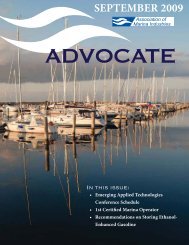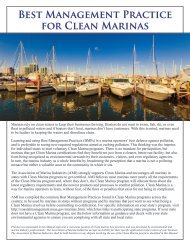6Technical AdviceFrom Bob AdrianceThree Myths About EthanolIn the five years since ethanol began to be widely used inthe United States, a lot has been written about its properties,the problems it has created, and how to best cope withits possible effects. Some <strong>of</strong> the advice has been based onscience and some on hearsay.Seaworthy talked to two engineers who have over 75 years<strong>of</strong> combined experience working with gasoline: Jim Simnick,technical advisor at BP Global Fuels Technology andLew Gibbs, a senior engineering consultant and a ChevronFellow. Seaworthy asked three questions about popular“myths” that could affect how people deal with ethanolenhancedgasoline. Their answers are summarized below.***********Question: Does ethanol-enhanced gasoline (E-10) lose octanemuch faster than regular gasoline?less gasoline in the tank means there will be less ethanolto absorb the condensation. It’s interesting to note that inareas <strong>of</strong> the Midwest that have been dealing with E-10 forover a decade, topping <strong>of</strong>f tanks is common practice. (Asan alternative, completely emptying the tank would eliminateany chance <strong>of</strong> phase separation.)If phase separation occurs, the highly corrosive ethanol/watermixture will settle to the bottom <strong>of</strong> the tank and remainthere even after fresh fuel is added in the spring. The onlyway to remedy the problem would then be to drain the tankand add fresh gasoline. The best way to avoid phase separationover the winter (aside from completely draining thetank, which isn’t practical) is to leave the tank full (95-percentfull to allow for expansion) so that there is less moist airin the tank, less space for condensation to collect, and moregasoline to absorb whatever moisture does accumulate.This is an especially important question because many mechanicsbelieve that octane loss during winter storage couldbe great enough to damage an engine when it is run in thespring. These same mechanics will <strong>of</strong>ten recommend leavingthe tank almost empty so that fresh gasoline can beadded in the spring to raise depleted octane levels.Answer: While all gasoline loses octane as it ages, ethanol-enhancedgasoline loses octane at about the same rate as regulargasoline. Both Gibbs and Simnick said that the loss <strong>of</strong> octaneover the winter would not be sufficient to damage an engine.Note, however, to keep any gasoline, including E10, as fresh aspossible, they said it’s good practice to always add an antioxidantwhenever the boat will be idle for long periods.The recommendation to leave a tank mostly empty is badadvice because it could significantly increase the amount<strong>of</strong> water that gets into the tank. (When enough moisture isattracted through the vent, the ethanol will separate fromthe gasoline.)Leaving a tank mostly empty does three things to increasethe chances <strong>of</strong> phase separation: 1. It increases the volume<strong>of</strong> open space in the tank (its “lung capacity”) so it can“breathe in” moist air. 2. An almost empty tank leaves morespace on tank walls for condensation to form. 3. Leaving
7Question: Since E-10 attracts water, is it important to installa water separator to prevent the water reaching the engine?Answer: Unlike regular gasoline, which can absorb almostno moisture, E-10 can hold up to ½ percent <strong>of</strong> water by volume,and the water molecules will dissolve in the fuel. Thesolubilized water will bypass the water separator and burnharmlessly through the engine. Only if phase separationwere to occur would a water separator do its job, but bythen the fuel itself would be the problem. Phase-separatedgasoline consists <strong>of</strong> a water/ethanol mixture on the bottom<strong>of</strong> the tank and reduced-octane gasoline floating at the top,either <strong>of</strong> which will damage your engine.Note, however, that a fuel filter (10-micron) is essential tokeep gunk from reaching your engine. Ethanol is a solventthat dissolves resins, rust and dirt that have accumulatedon older tank walls. Especially when you first make thetransition to E-10, it is important to carry spare filters anda galvanized bucket to store used filters prior to disposal.Even in new engines and tanks, E-10 will sometimes forma mysterious gooey substance that will also clog filters.Richard Kolb, the manager <strong>of</strong> Emissions and Regulationsfor Volvo Penta, believes the goo is caused by water mixingwith one or more <strong>of</strong> the 108 approved compounds that canbe used in gasoline. These compounds vary among suppliers,so one solution is to change to a different brand <strong>of</strong>gasoline. Another is to use carburetor cleaner, which hesays has sometimes remedied the problem.Question: Are there additives that will prevent phase separation?Answer: Both Gibbs and Simnick said that the additivesthat eliminate water may work incrementally to protectagainst phase separation, but as Jim Simnick said there isno additive that will stand up to a good slug <strong>of</strong> water.Curiously, if E-15 were to be allowed, it would be less proneto phase separation than E-10 since the additional alcoholwould absorb more water. That’s the good news. But—thebad news--adding more ethanol raises other issues withmaterials compatibility: elastomers, plastics and metalsmay be affected because alcohol is more corrosive thangasoline and engines have only been tested with E-10. Also,adding oxygen in the fuel may cause the engine to run hotter,especially if a computer does not control combustion.***********Bob Adriance is editor <strong>of</strong> Seaworthy, the BoatU.S. DamageAvoidance publication that is based on real insuranceclaims. Bob is also the Author <strong>of</strong> Seaworthy, EssentialLessons from BoatU.S. 20-Year Case File <strong>of</strong> ThingsGone Wrong published by McGraw-Hill/InternationalMarine.GOINGGREENThis month’s feature: Protect WaterwaysThis month’s tip brought to you by Elizabeth LaPorte atMI Sea Grant http://www.miseagrant.umich.edu• Restrict all maintenance to designated areas, ideally100 feet or more from water, to contain or eliminatepollutants—no debris should be allowed to enterany waterways.• Contaminants from hull maintenance are moreeasily contained on land.• Maintenance areas should be paved and shelteredfrom rain to prevent debris from entering waterwaysfrom run<strong>of</strong>f.• Post signs, such as “Maintenance Area for Stripping,Fiberglass Repair, and Spray Painting.”• If a hard surface maintenance area is not practical,perform maintenance work over tarps or filter fabricto collect paint chips and other debris. Filter fabricallows water to pass through, unlike plastic.• Post fliers with maintenance guidelines for boatowners and contractors throughout the boatyard,such as “Use plant-based solvents and green cleaningproducts.”• Use drip pans when handling any type <strong>of</strong> liquid, and useseparate drip pans for each fluid to avoid mixing.• Use funnels to transfer all fluids, particularlypetroleum-based strippers and solvents.• Allow solids in used strippers and thinners to settle,making solvents reusable.• Use only one cleaning solvent to simplify disposal.• Use only the minimal amount <strong>of</strong> solvent needed.Lew Gibbs says the best way to prevent phase separation inE-10 is to “keep it dry, keep it dry, keep it dry.” That meanskeeping the tank filled to prevent condensation.Pour solvent into a small container for smaller jobs.



